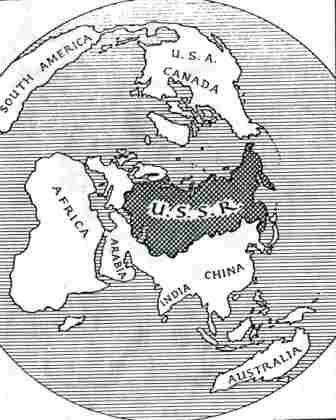
1946:1991; The "Cold War" as a "Third World" Event
Two polar projections of the Northern Hemisphere in the half century of Cold War
1. Simple outline map, a polar projection
2. More complex polar projection indicating global commitments of USA & USSR [unfinished]
*2014:Map
of maximum global expansion of Communist rule
"Cold War" in the "Third World" [ID]
*1857+: India [India LOOP from imperial subordination to national independence]
*1908+: "Young Turks"
*1928:Peru
*1945+: Vietnam
*1949oc:Chinese Revolution
*1949de:Indonesia
*1953: Iran (Persia)
*1955ap:Bandung Conference
*1956jy:Egypt
*1961:Ghana
*1958my:Algerian Revolution
*1978ap+: Afghanistan
*1955:Bandung | Final Communiqué of the Asian-African Conference [ID Bandung Conference] included the following observations and recommendations [RWP2:540-1] =
[…]
D. Problems of Dependent Peoples
1. The Asian-African Conference discussed the problems of dependent peoples and colonialism and the evils arising from the subjection of peoples to alien subjugation, domination and exploitation.
The Conference is agreed:
(a) in declaring that colonialism in all its manifestations is an evil which should speedily be brought to an end;
(b) in affirming that the subjection of peoples to alien subjugation, domination and exploitation constitutes a denial of
fundamental human rights, is contrary to the Charter of the United Nations and is an impediment to the promotion of
world peace and cooperation;
(c) in declaring its support of the cause of freedom and independence for all such people, and|
(d) in calling upon the powers concerned to grant freedom and independence to such peoples.
2. In view of the unsettled situation in North Africa and of the persisting denial to the peoples of North Africa of their right to self-determination, the Asian-African Conference declared its support of the rights of the people of Algeria, Morocco and Tunisia to self-determination and independence and urged the French Government to bring about a peaceful settlement of the issue without delay.
E. Other Problems
1. In view of the existing tension in the Middle East, caused by the situation in Palestine and of the danger of that tension to world peace, the Asian-African Conference declared its support of the rights of the Arab people of Palestine and called for the implementation of the United Nations Resolutions on Palestine and the achievement of the peaceful settlement of the Palestine question.
2. The Asian-African Conference, in the context of its expressed attitude on the abolition of colonialism, supported the position of Indonesia in the case of West Irian based on the relevant agreements between Indonesia and the Netherlands.
The Asian-African Conference urged the Netherlands Government to reopen negotiations as soon as possible, to implement their obligations under the above-mentioned agreements and expressed the earnest hope that the United Nations would assist the parties concerned in finding a peaceful solution to the dispute.
3. The Asian-African Conference supported the position of Yemen in the case of Aden and the Southern parts of Yemen known as the Protectorates and urged the parties concerned to arrive at a peaceful settlement of the dispute.
F. Promotion of World Peace and Cooperation
1. The Asian-African Conference, taking note of the fact that several States have still not been admitted to the United Nations, considered that for effective cooperation for world peace, membership in the United Nations should be universal, called on the Security Council to support the admission of all those States which are qualified for membership in terms of the Charter. In the opinion of the Asian-African Conference, the following among participating countries, viz.: Cambodia, Ceylon, Japan, Jordan, Libya, Nepal, a unified Vietnam were so qualified.
The Conference considered that the representation of the countries of the Asian-African region on the Security Council, in relation to the principle of equitable geographical distribution, was inadequate. It expressed the view that as regards the distribution of the non-permanent seats, the Asian-African countries which, under the arrangement arrived at in London in 1946, are precluded from being elected, should be enabled to serve on the Security Council, so that they might make a more effective contribution to the maintenance of international peace and security.
[…]

|
|
|
|
|
|
|
|
|
|